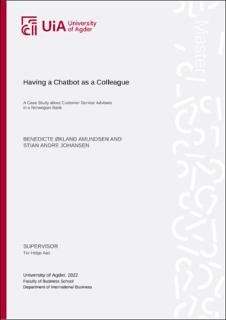Having a Chatbot as a Colleague
Master thesis
Permanent lenke
https://hdl.handle.net/11250/3036477Utgivelsesdato
2022Metadata
Vis full innførselSamlinger
Sammendrag
Research on digital technologies can provide valuable insight as the digital transformation area continues to grow. Chatbots have received a massively increasing interest in the latest year. The implementation of a chatbot can affect the human customer service advisor's workday. Previous research focuses on different aspects of the chatbot from an organizational or customer perspective. However, there is limited prior research that provides insight into how the chatbot affects the employees. Hence, the thesis had an exploratory approach using the Gioia method to discuss the chatbot's effects by conducting in-depth interviews with customer service advisors in a collaborative Norwegian bank. A new framework was created based on the findings. The chatbot affects the customer service advisors in two dimensions, narrowed down in six categories: (1) it leads to a change in tasks, (2) it affects efficiency, (3) how the chatbot's limited skills can cause frustration, (4) feeling of job security, (5) the degree of ownership the employee has, and (6) how the chatbot is perceived as a colleague rather than a competitor. Based on these findings, a discussion on how the chatbot changes the customer service advisors’ role and how it affects the relationship with the chatbot is elaborated. Then, based on the discussion, theoretical propositions are given to each of the categories from the findings. Finally, a framework, conclusion, limitations, and suggestions for future research are provided. The primary contribution of this thesis is to extend the insight into how chatbot affects customer service advisors in the banking industry, as it can be valuable both for the advisor and the organization's business performance.
